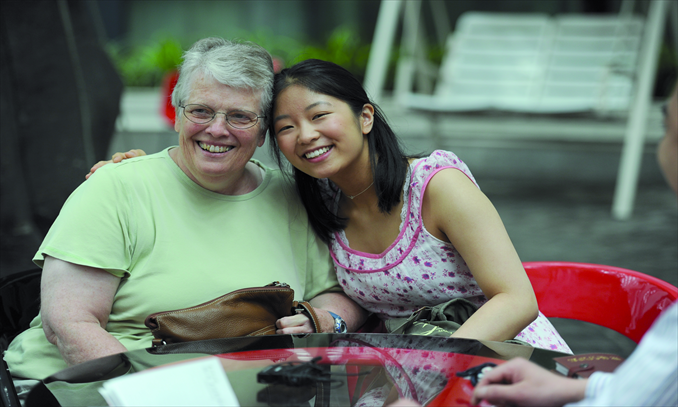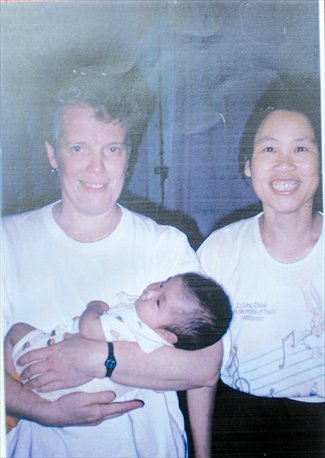On the trail of your parents

After a 17-hour flight, Jenna Cook, a 20-year-old Chinese-American girl, finally arrived in Wuhan, Hubei Province, on May 23, along with her adoptive mother Margaret Cook.
This was Jenna's fifth visit to China. On her previous trips, she studied Chinese or worked as a social welfare volunteer in Wuhan. This time, Jenna had a very specific goal in mind.
"I want to find my birth parents during my one-month stay here," said Jenna during a "micro interview" via her newly created Weibo microblog on May 25. In the interview, Jenna shared her story with Chinese Internet users and asked for their help. Her story soon generated huge interest and her first tweet attracted more than 28,000 comments.
A sophomore student at Yale University, Jenna may look Chinese but her native English pronunciation reveals where she grew up.
On March 24, 1992, a baby girl only a couple of months old was found abandoned at a local sub-district office with the Wuhan Children Welfare House, which accepted the girl and named her Xia Huasi.
A local family from the district of Hankou in Wuhan took care of her for a short time until Margaret Cook, a then 42-year-old primary school teacher changed her life forever on June 30. The girl then got an English name, Jenna.
The law allowing foreigners to adopt Chinese orphans came into effect in 1992. Jenna was among the first batch of 232 babies to be adopted by foreign families. Most of these were girls due to the Chinese traditional view of preferring boys.
In Jenna's description given to CCTV, she spent a very happy and carefree childhood at her home in Newburyport, Massachusetts. However, her ethnicity made her stand out, for which she felt very lonely sometimes.
"Except for a couple who came to run a Chinese restaurant when I was 5, there was nobody in town that looked like me," said Jenna. Margaret never hid from her daughter the fact she was adopted. As Jenna grew up, her mother helped her explore her Chinese heritage. She learned Chinese at school, learned how to use chopsticks and even some traditional dances. One of Jenna's wishes is to spend a traditional Chinese Spring Festival at her birth place in the near future. She also dreamed about getting married some day wearing a qipao, a traditional dress for Chinese women.
Jenna finally made her first trip to China in 2002, when she turned 10 years old.
"I was shocked to find out there was a place with so many people who all looked like me," Jenna said, trying to capture her initial feeling. Yet, despite the language barrier, she felt a connection. "Simply through the expressions of the Chinese people I met, I could feel we all had the same roots," she said.

Beyond cultural differences
Since China allowed adoptions from abroad, statistics show more than 120,000 Chinese children have been adopted by foreign nationals since 1992, with the US topping the list.
According to the US China Press, since 1999, US families have adopted more than 60,000 Chinese children, including 7,906 in 2005 alone.
Jenna's search for her birth parents is far from unique. Most children in her situation have felt some confusion about their identity, with part of them always wondering what might have been and who their birth parents were.
Back in 2009, a teenage boy named Christian Norris traced his roots to a remote village in Ningxia Hui Autonomous Region. Fully backed by his mother, Julia Norris, who had adopted him and brought him to Maryland in the US, Christian finally found out the truth about his birth after three years of searching and was reunited with his birth family after 11 years.
"It wasn't something he wanted, but something he really needed to form his own identity," Julia Norris told CNN back in 2009.
In the same year, 46 Chinese children adopted by foreign families traveled back to China with their adoptive parents to seek out their origins.
Compared with these cases, Jenna's trip this time stirred quite a sensation not only in Wuhan, but across the country. Over the past month, Jenna's story has gone viral and her microblog has nearly 100,000 followers who keep a close eye on Jenna's findings.
"It's largely due to the sharp cultural contrast embedded in Jenna's search for her birth parents," said Qiao Huazhong, director general of Jingchu Love Alliance, an NGO in Wuhan which has helped Jenna in her search.
While winning support and admiration from many Chinese for her determination to find her long-lost birth parents, Jenna's kindness and forgiving attitude towards her birth parents, who abandoned her in the first place, have also raised heated debate.
Love triumphs
Jenna has always emphasized that she doesn't resent her birth parents. She just want to know how they are, even if she only meets them for a few minutes. "I don't want to bother or disturb them," the girl told CCTV.
"They gave life to me. I feel very grateful and I love them and miss them very much… I will never forget them, and just want to give them my love," the girl added.
But this forgiveness has not met only with support. Some insist that instead of trying to find her birth parents, Jenna should focus on repaying the love and care of her adoptive mother.
"It isn't worth the effort of finding your birth parents. Don't bring hurt to the one who loves you dearly," one person wrote on Jenna's Weibo.
"You have done a thing that most people can't, as you are using love to repay the hurt your birth parents gave you when they abandoned you on the street. But you should be very grateful for your adoptive mother, who educated you with her selfless love as a mom," a Web user named Zhang Wei commented.
Unusual tactic
It is not just Jenna who is responsible for giving Chinese people such a culture shock.
For all these adopted children, the search for their roots were all strongly supported by their adoptive parents from overseas, which goes against traditional Chinese practice, in experts' opinions.
"It's a common practice for Chinese adoptive parents to cut off any traces to prevent their children from realizing their true identity. They fear the disclosure of the truth will push their adopted children to their birth parents, and finally, make them lose the child after so many years of raising them," said Qiao. In traditional Chinese culture, the emphasis on children's filial piety toward their birth parents has often prevented adoptive parents from telling the truth to their children.
Standing in sharp contrast, over the past 20 years, Margaret has documented everything that could become a clue in helping Jenna trace her origins.
"I feel very touched when Margaret says she never regrets helping Jenna, as she just wants to share a wonderful girl with her real parents. This is the very thing that very few Chinese adoptive parents could do," Qiao added.
While many Chinese, including Qiao, expressed their admiration for Margaret, many American adoptive parents say they would do the same.
"My daughter will have my full help and support if she decides to search someday," says an American adoptive mother named Kristen Fitzgerald.
"A survey found that more than half of American families who have adopted Chinese children want their children to have a good understanding of their birth country and to keep aspects of their Chinese culture," Wang Xiaoning, the founder of China Sprout in the US, an e-commerce website dedicated to promoting learning of Chinese language and culture, told the Global Times.
This has led Chinese insiders to call for a change of attitudes among Chinese adoptive parents.
"To allow children to know the truth will not only help them grow up healthily, but will also prevent a cover-up story and making them live a lie," said the head of Children's Hope International, an NGO which has been engaged in the international adoption business for Chinese orphans for more than 10 years.
Search goes on
From May 23 to June 25, Qiao and his volunteers found 44 families to meet Jenna in person, with 36 of them taking DNA tests. But no positive result has come out so far.
Realizing the journey could be extremely difficult and tough, Jenna is unswerving in her goal.
"Even if I can't find them this time, I will keep on trying. I will search for them for the rest of my life," she vowed.
But as part of the first generation of Chinese who were adopted by foreign families, Jenna's search might be just the beginning of a bigger trend as more and more internationally adopted Chinese children grow up.
"For these once-abandoned children, this is not only a search for their Chinese roots and culture, but a search for the confidence to be who they truly are," said Bai Yansong, a well-known Chinese talk show host, on the 46 originally adopted Chinese children's search for their Chinese roots in 2009.
Zhu Yuanli contributes to the story